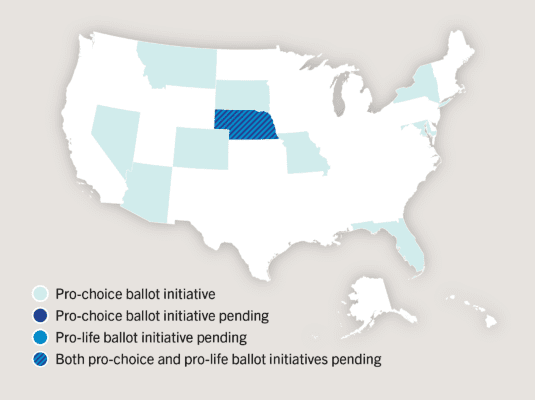The events of 2022 had an effect on many issues that we will be dealing with in this new year. Four stories related to ERLC concerns that you should watch in 2023 are:
- Abortion after Roe v. Wade
- Legislation in a divided government
- A religious liberty Supreme Court case
- The SBC’s formal response to sexual abuse
Find out more below.
Abortion after Roe v. Wade
The overturning of Roe v. Wade in last year’s Dobbs decision marked a true turning point for the pro-life movement, a moment that Christians, advocates, and many others worked toward tirelessly for 50 years.
Now, the pro-life movement will be faced with other challenges to protect life in the womb.
A key issue is how we will deal with “medication” abortion.
In 2020, abortion via pills rather than surgery accounted for the majority of all United States abortions for the first time in the pills’ 20-year history. Reinforcing access to these medication abortions was one of the Biden administration’s first responses to the fall of Roe. President Joe Biden “directed the Secretary of Health and Human Services to identify all ways to ensure that mifepristone [one of the two drugs used in pill-based abortions] is as widely accessible as possible.”
This week, the Justice Department cleared the U.S. Postal Service to deliver abortion drugs to states that have strict limits on abortion. But states may be able to fight back by prosecuting people who send abortion pills through such mailings. In addition, as Jason Thacker explains, the Food and Drug Administration (FDA) issued a regulatory change this week that allows pharmacy chains and local pharmacies to distribute the first of the two-stage abortion pill regiment known as Mifepristone.
Legislation in a divided government
In the U.S. House of Representatives, the GOP controls the majority by only 10 votes (222-213), while in the Senate the split is 49-49 with independents who caucus with the Democrats.
The result is that neither party will be able to pass any major partisan pieces of legislation this year.
Lack of bipartisan support will also prevent anything from being passed other than funding requirements (debt ceiling, farm bill, government funding, etc.).
One possible long-shot exception is immigration reform. Sen. Kyrsten Sinema (I-AZ) and Sen. Thom Tillis (R-N.C.) have proposed legislation that would increase spending on border security by more than $25 billion, provide pay raises to Border Patrol agents, extending Title 42 for at least a year, creating regional centers to swiftly process asylum claims, and provide a pathway to citizenship for 2 million immigrant “Dreamers” who came to the U.S. as children.
(Note: A key part of ERLC’s policy agenda is support of a permanent solution for Dreamers, the young immigrants who were brought to the United States by their parents and that remain without permanent legal status despite having broken no laws.)
A religious liberty Supreme Court case
This summer, the U.S. Supreme Court will issue its ruling in 303 Creative v. Elenis, an important case for free speech and religious liberty.
The case involves Lorie Smith, founder of the web design firm 303 Creative, who challenged a Colorado law that violates her First Amendment rights. It is the same law that was used to target Jack Phillips and which led to the 2018 Masterpiece Cakeshop v. Colorado Civil Rights Commission case. In that case, the Court ruled favorably for Jack Phillips on narrow grounds but failed to address the underlying conflict between anti-discrimination laws and free speech rights.
This case has significant implications for the free speech of all people. If the court rules against Smith, it would establish a precedent that artists can be forced to create and communicate messages that violate their beliefs.
The SBC’s formal response to sexual abuse
At the 2022 SBC annual meeting, a 288-page report was released by a task force commissioned to address allegations of sexual abuse by senior members of the denomination’s Executive Committee, mishandling of abuse allegations, and mistreatment of victims.
During the annual meeting in New Orleans this June, SBC messengers will likely be asked to address some or all of the recommendations outlined in the report.
Some of the recommendations are:
- Forming an Independent Commission and later establishing a permanent Administrative Entity to oversee comprehensive long-term reforms concerning sexual abuse and related misconduct within the SBC.
- Creating and maintaining an Offender Information System to alert the community to known offenders. Make the OIS available to churches on a voluntary basis.
- Providing a comprehensive Resource Toolbox including protocols, training, education, and practical information.
- Creating a voluntary self-certification program for churches, local associations, state conventions, and entities based on the implementation of “best practices” to bring awareness to, and enhance prevention of, sexual abuse.
- Improving governance controls, including the use of enhanced background checks, Letters of Good Standing, and Codes of Conduct to voluntarily strengthen hiring standards and improve governance.









